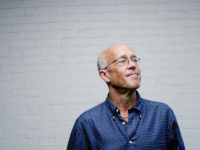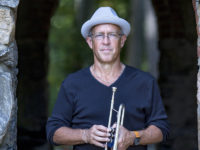You mean the great jazz singer from the 40’s and 50’s, you ask? Not hardly, but carry over the word “jazz” and shift the “voice” from vocal to the cello (and the location from L.A. to Vancouver), and you’ll have the “Peggy Lee” I want to tell you about.
Ms. Lee is pretty prominent in the Vancouver area, performing in wide-ranging ensembles including an opera orchestra, a string quartet, a new music combo and a vocal/cello duo with Mary Margaret O’Hara called Beautiful Tool. Lee has also performed with Dave Douglas, Robin Holcolmb, Bill Frisell, Nels Cline and Dave Douglas, but most likely her main outlet for her artistry is her own Peggy Lee Band. About a month ago, this octet released their fifth album, Invitation, a batch of eleven originals, ten by Lee and one by O’Hara. O’Hara’s not in this band but many of Vancouver’s finest are: Brad Turner (trumpet, flugelhorn), Jon Bentley (tenor saxophone), Jeremy Berkman (trombone); Ron Samsworth (guitars), Tony Wilson (electric guitar), Andre Lachance (electric bass) and Dylan van der Schyff (drums, percussion).
Peggy Lee can play a pretty mean cello, but she takes her compositions and the collective approach of her band too seriously to let this music become a mere platform for her skills on this stringed and bowed instrument, making Invitation all the more interesting because of that. There is an Americana, chamber jazz element at the core of all of her songs (think Frisell’s string bands for a rough approximation), but also there’s the feeling free to cut loose with free jazz at seemingly anytime the mood strikes. Lee can craft some very linear compositions that are easy to digest despite some underlying complexity, whenever there’s no abrupt mood shifts. Although, I kind of like those abrupt mood shifts.
The most surprises — and there are quite few despite the generally slow moving pace of these songs — are found on “Why Are You Yelling?” Imagine a performance that begins with the manic open strumming of guitar followed by random fingering., not playing real chords, just making noise. The actual song commences two minutes in, with a 1920’s jazz groove but the guitar is still acting freaky. The song proceeds to get off the Dixieland train and soon Berkman is all alone with his trombone eventually joined in free improv by Lee and then Bentley. And then Turner. Everyone floats back and forth between improvisation and the earlier theme. Lee creates tension, unpredictability and suspense moving freely between the scored and the scattered.
This device of using toneless commotion by solo performers as intros into better defined melodies is used in several other instances. Lee takes her turn on “Your Grace,” wringing from her cello contorted sounds that might present a challenge to even an Erik Friedlander, but it leads into a majestic strain, and during that segment she delivers a pretty, classically inspired solo. “Chorale” begins with van der Schyff’s wild but brilliant intonations, leading into a solemn progression that turns darker, inviting Lee and others to interject their own dissonant sounds. “Not So Far” begins with a three way free improv among Lee, Samworth (or Wilson) on electric guitar and van der Schyff that creates some really alien sounds, followed by everyone turning more conventional. Well, everyone except for Lee, again creating sparks with tension and contrast.
“Path of a Smile” (Youtube above) is arguably Lee’s best composition of the album. No whack jazz excursions here, but a sophisticated harmonic structure and enhanced by a Dave Douglas-like trumpet solo from Turner and a Steve Swallow-like electric bass solo from Lachance. “Little Pieces” might have gotten its name from the structure of the song: it’s a lot like smaller, related pieces put together into one larger one. We’re first treated to fine performances from Bentley on tenor sax and Turner on trumpet, but the tempo evolves from chamber folk-jazz to outright rock by the end. “Punchy” is a quick-tempoed post-bop tune headlined by Bentley’s Rollins impressions for half of the song and then Wilson leads the song into a experimental rock direction for a while. O’Hara’s “You Will Be Loved Again” is given a melancholy mood by something that’s sonically similar to a pre-war blues-jazz orchestra. Following the lazy, 3/4 swing of “End Waltz” comes Lee’s most accessible melody of the album, “Warming.” Made even more ingratiating by a faux-calypso cadence, it’s helped along by laid-back guitar soloing and congenial horn charts.
Overall, however, The Peggy Lee Band’s Invitation might not be the most inviting jazz out there, but there’s plenty of parts easily digestible for most, and the parts that aren’t are where the rewards are even greater for open-minded listeners.
Invitation was released October 23, by Drip Audio.
[amazon_enhanced asin=”B009I9Y6TK” /] [amazon_enhanced asin=”B009A678HI” /] [amazon_enhanced asin=”B001MEJYCI” /] [amazon_enhanced asin=”B00023M13O” /]
- Soft Machine – ‘Drop’ (1971, 2025 remaster) - May 21, 2025
- Marshall Allen’s Ghost Horizons – ‘Live In Philadelphia’ (2025) - May 19, 2025
- Satoko Fujii This Is It! – ‘Message’ (2025) - May 14, 2025



